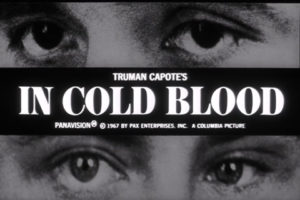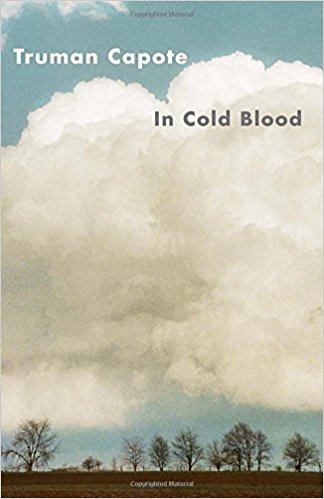
by Drew Howerton, senior executive editor
I used to be an avid reader, and then I hit high school. Reading books for class took up much of my free time for leisure reading and as a result diminished my interest in reading. Over the past year and a half, I’ve put together both mental and written lists of books that I want to read this summer now that I finally have more time. Enter Drew’s Book Corner, a cozy nook where I discuss books on a wide range of topics, from true crime novels to presidential biographies.
In 1959, the quadruple homicide of a prominent farmer family rocked the tiny town of Holcomb, Kansas. The victims, Herb Clutter and his family of four, were brutally killed by a shotgun held mere inches from their faces. Holcomb and the nation at large were left reeling from a horrible crime with seemingly no motive and worse, no suspects. After hearing of the murders, Truman Capote traveled to Holcomb with his friend Harper Lee (yes, that Harper Lee), and together they interviewed town locals, the investigators, and the criminals themselves, writing what eventually became Capote’s magnum opus: In Cold Blood.
Throughout In Cold Blood, Capote describes the Clutter family’s actions up until the night of their murder, the confused residents of Holcomb, and the killers as they embark on a cross country trip in hopes of evading capture. This creates a really fascinating triple narrative that showcases the entire scope of the crime and makes an underlying comment on the nature of violence: there is always more than one victim. Capote shows the Clutter family as an example of American exceptionalism. Herb Clutter is an upstanding father and respected farmer. Bonnie, Herb’s wife, is a bedridden but beloved mother. Nancy, Herb’s daughter, is a member of the 4H Club and tutors younger children while Herb’s son Kenyon is an aspiring engineer. Capote gives an in depth look into the victims in order to portray them as innocent, good people who died senselessly. On a broader level, Capote also recounts the murder’s effects on the town. Small town America in the 50s was a peaceful, quiet place where nobody locked their doors, everybody knew each other intimately, and violent killings were reserved for the big cities. So when the Clutter family was murdered, the town of Holcomb was turned upside down as residents immediately suspected that the killers were one of their own. Capote depicts this in interviews with town residents, as well as giving “slice of life” descriptions of the town diner where gossip is in no short shortage.
but beloved mother. Nancy, Herb’s daughter, is a member of the 4H Club and tutors younger children while Herb’s son Kenyon is an aspiring engineer. Capote gives an in depth look into the victims in order to portray them as innocent, good people who died senselessly. On a broader level, Capote also recounts the murder’s effects on the town. Small town America in the 50s was a peaceful, quiet place where nobody locked their doors, everybody knew each other intimately, and violent killings were reserved for the big cities. So when the Clutter family was murdered, the town of Holcomb was turned upside down as residents immediately suspected that the killers were one of their own. Capote depicts this in interviews with town residents, as well as giving “slice of life” descriptions of the town diner where gossip is in no short shortage.
What I like about In Cold Blood is that Capote manages to address a disturbing subject matter in a fascinating way; not quite a morbid curiosity, but close. I’ve always been interested in crime stories – real crime, not just campy stuff like Law & Order. I really like to get under the surface and look at the psyche of a criminal, the factors and motivations that led them to commit a crime. In this respect, reading In Cold Blood was the equivalent of ordering a soda from a vending machine and getting two because Capote devotes the majority of the book to examining the criminals, Richard “Dick” Hickock and Perry Smith. Working off of courtroom testimony, interviews with the killers’ families and Hickock and Smith themselves, Capote recounts their movements as they plan and perform the Clutter killings and take off on a cross country road trip immediately afterward. It is a tale that even the best fiction writers would struggle to come up with, and the way that Hickock and Smith are characterized, I almost felt bad for them in a sad, twisted way. Hickock grew up poor and could not afford college, and became a mechanic after a serious car accident, eventually skipping out on two marriages and turning to a life of crime. Smith was a narcissist who had a near nonexistent home-life, traveling cross country with his dad and suffering horrible pain in his legs after a motorcycle accident. The pair eventually ended up in the same prison together and became partners. I feel bad for these men because to me, they represent the failure of the American Dream. Clearly troubled from strained family ties and lack of financial means, both turned to lives of crime sort of out of necessity. Hickock wrote so many fraudulent checks that it seems almost like an addiction for him, although he always swore he would pay them off and really seems to mean it, after seeing how his schemes affected his father. Smith, due to the constant pain in his legs, is addicted to aspirin and resorts to stealing in order to get a quick fix. Killing the Clutter family, in their mind, is the last crime they will ever commit before fleeing to Mexico to live a life of leisure. Both poured their hearts and souls into the American Dream, but were forced onto the fringes of society, eventually finding their way back in and making national headlines. It really makes me wonder what our criminal justice system would be like if there was more of an emphasis on rehabilitation. Both Hickock and Smith were in and out of prison for most of their lives, and perhaps they wouldn’t have turned to horrible violence had they been help of some kind.
Speaking of violence, the book portrays it almost as an afterthought. A couple of times, Smith makes reference to a time when he allegedly killed a man with a bike chain, an anecdote he makes up to gain Hickock’s favor. The murder of the Clutter family is very slow and calculated, and Capote describes it in an almost painfully suspenseful way, making every shotgun blast ring in my head, yet feel nonthreatening and almost non important. The depiction of violence in this manner actually strengthens its impact and underscores an alarming point that Capote is trying to make. Our media is absolutely saturated with violence. Movies, TV shows, and video games all depict violence in very obvious ways, and it is very hard to watch the news without hearing about death and destruction, either here or abroad. Violence, when permeated throughout society like this, becomes nothing but background noise. Capote, by writing about a violent crime with very little attention to the actual violence, made this point very clearly to me. However, Capote’s to-the-point approach to writing about violence is very chilling. At one point in the book, he describes the funeral of the Clutter family, how it was an open casket affair even though the victims were virtually unrecognizable due to the shotgun blasts. That was really upsetting to read about, and potential readers beware: there are a couple upsetting moments in the book.
Overall, I really liked In Cold Blood. I have never read a true-crime novel before, having instead preferred documentaries. I specifically picked In Cold Blood for this reason: I wanted to read something out of my comfort zone, something that would challenge me in terms of content. I had to trudge through the first chapter or two as I got accustomed to Capote’s style, because I felt like I was reading a newspaper article. However, I realized that Capote had incredible talent for packing so much detail into every sentence, and he began to weave an incredible narrative that I couldn’t put down. I had to know what happened, what Hickock and Smith’s next move was, which is something that doesn’t normally happen with non-fiction considering I could’ve just googled the outcome of the crime. I discovered that I actually enjoy true-crime a lot, and I think that my next true-crime book will probably be Helter Skelter, the book about the Charles Manson murders, by Vincent Bugliosi. More importantly though, walked away from this book with a newfound appreciation for my semi-small town life, as well as a somber reminder that life can be horribly short.

